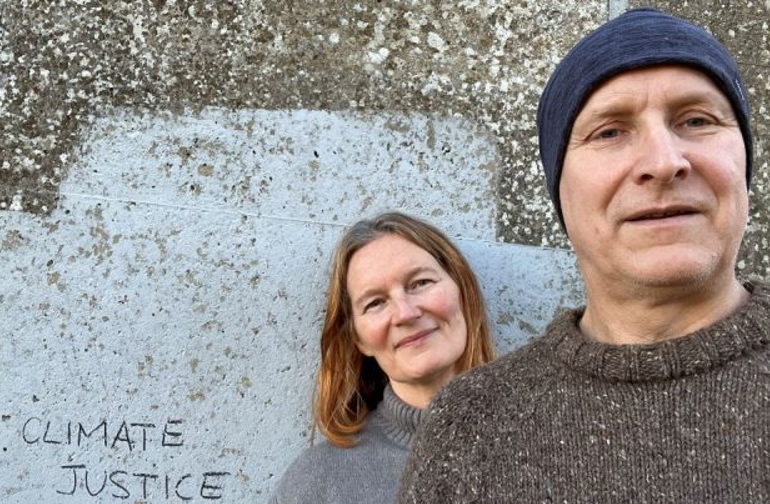Sheffield activists Ci Davis and Darcy White explain their work in the Jubilee Movement, a new mutual aid-based debt justice campaign
Ci: As a child I went on CND [Campaign for Nuclear Disarmament] marches with my parents. Our home was shared with Chilean and South African exiles, and I learnt much about injustice. I was later imprisoned for engaging in non-violent direct action to stop the deployment of cruise missiles. The 1980s were an important time to be an activist.
Darcy: I became radicalised at a very young age, after witnessing a headteacher’s nasty racist behaviour towards a friend. I co-founded a branch of Amnesty in my sixth form, and later took part in the antinuclear ‘Snowball’ campaign, for which I served a prison sentence.
Ci: We worked at developing a national strategy before launching Jubilee in Sheffield. If you want to build community, you start close to home. We were involved in developing a justice group in our Extinction Rebellion branch, but another vehicle was clearly needed to focus on emergencies beyond climate.
Jubilee refers to the celebration of debts being cancelled in many societies in ancient times. Slaves were freed from debt bondage and there was a redistribution of wealth – a ‘reset’ moment.
Enormous debt now shackles people and countries. Global debt is four times the global GDP and doubling every eight-and-a-half years. Fifty-four countries are in debt distress. Debt cancellation is a unifying demand – we cannot address the crises created by capitalism while the debt exists.
Darcy: Jubilee is a fundamental challenge to our economic system, which depends on domestic and international debt. While paying off payday loans, loans to offset fuel bills, etc, we are less able to meet everyday needs and our purchasing options are limited. International debt cancellation would prevent multinational companies perverting markets and forcing poor nations to sell resources to pay debt off at high interest rates.
We run a free public meal at the end of every month. Its purpose is to incrementally build networks of solidarity – connecting activists, community groups and vulnerable people through open dialogue and simple but meaningful support.
Ci: My guiding principles have been ‘think globally, act locally’. The Black Panthers used mutual aid as a direct-action strategy. Mutual aid allows us to build a larger base of local support, recognising people’s immediate concerns and the need to look after one another.
Darcy: Mutual aid cultivates a radical approach to community self help and resilience. I’d recommend Dean Spade’s essay ‘Solidarity Not Charity: Mutual Aid for Mobilisation and Survival’ to understand the rationale underpinning mutual aid as a strategy.
Ci: We need to make connections with existing groups doing brilliant work – such as Women of Colour in the Global Women’s Strike. In Sheffield we’re also working with migrant rights groups and learning from conversations with people who attend the meal regularly.
Darcy: We learned so much from activists from indigenous communities whose ways of life are founded on sharing, mutual support and sustainability. We must challenge entrenched western thinking in order to live well together with finite planetary resources.
Ci: Ultimately the aim of Jubilee is revolution – a celebration of multiple interconnected struggles, which joins the dots. I feel that Jubilee will be valuable to the wider anti-imperialist movement, highlighting interdependence, promoting indigenous knowledge and drawing those who feel excluded from mainstream activism into the struggle to build alternative power.
Ci and Darcy were speaking to Ananya Wilson-Bhattacharya
This article first appeared in Issue 238 (Winter 2022, Deluge and Drought) in our column The Spark, in which interviewees discuss their experiences of becoming involved with radical movements. Subscribe today to read more articles and support independent media.
Teaser photo credit: Ci Davis





